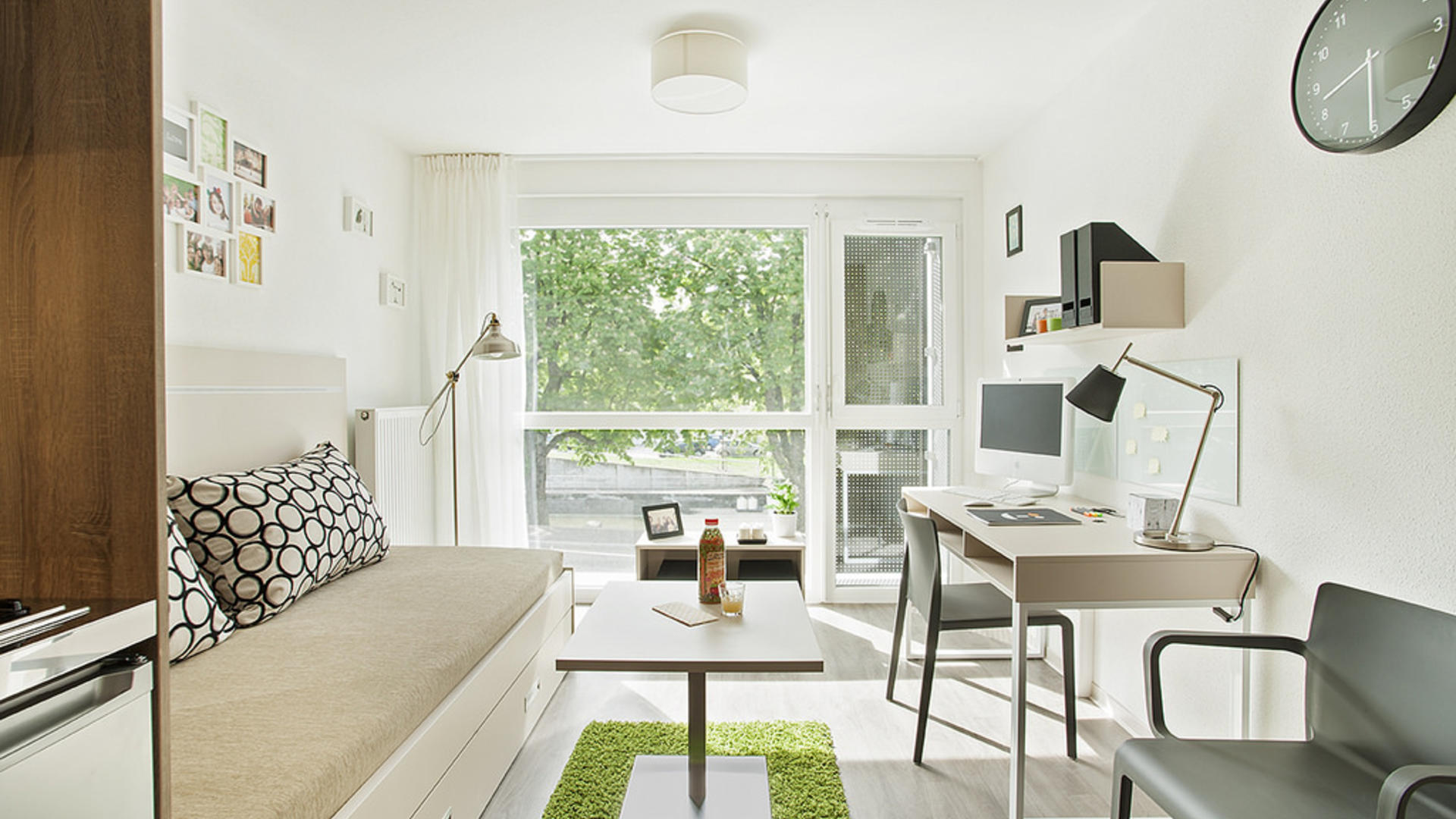

What sort of housing is for me? How do I find it? Can I get help paying my rent? What’s a guarantor? A lot of questions come up when you start thinking about where to live while studying in France. But don’t worry—we’re with you every step of the way.
For your stay in France, you have many housing options. You can choose between a publicly owned building or a private one, and between a student residence or an apartment that you may occupy alone, with other students, or with a family or local resident. Don’t panic! We’ll decode the various types of housing available to students and help you in your search.
Whatever type of housing you end up choosing, start your search early. Don’t hesitate to reserve a place, even if it’s temporary, so that you’ll have somewhere to sleep and store your things when you arrive. That will give you time to do a thorough search for a permanent place.
And don’t forget to ask the staff at your educational institution if they can help. Some institutions (especially the Grandes Ecoles ), maintain a stock of housing or have a system for connecting their students with housing providers.
To facilitate your search, we begin by distinguishing between two basic forms of housing for students in France:
With the exception of CROUS (in the case of housing for recipients of French government scholarships), Campus France has no partnerships with any entity offering student housing or related services. The entities mentioned in this article are cited solely to assist you in your search.

The residences managed by France’s regional centers for student services, known as CROUS ( centres régionaux des œuvres universitaires et scolaires ), are publicly owned and subsidized by the French government. CROUS buildings are the first choice of many students for the advantages they offer : the monthly rent is low (€450 in Paris; €350 on average elsewhere in France) and occupants qualify for housing assistance from CAF (France’s family assistance fund); the buildings are close to campus; and the opportunities for social interaction with other students are plentiful. In fact, the only drawback to CROUS rooms is that they are hard to get, because demand far exceeds supply.

1. The application process for international students varies depending on wether they are on a formal exchange program or they are free movers.
2. You can also contact your host higher education institution to ask if they have an agreement with the CROUS for housing solutions.
4. Lokaviz lists all of the units available in CROUS residences, as well as space offered by individual property owners. There’s no cost to review the posted vacancies. All of the units listed on the site have earned the Lokaviz label, so students can be sure they’re renting decent housing.

Located in the 14e arrondissement of Paris, the Cité internationale universitaire de Paris (CIUP) is a sprawling collection of university residences that house nearly 6,000 students, scholars, scientists, artists, and athletes from all over the world. Room rents vary depending on the amenities provided, the occupant’s age, and the duration of their stay.
To live at CIUP, one must be enrolled at an institution in the Paris region and working on a master’s degree or above. Learn more at the CIUP website under the tab Faire une demande de logement (apply for housing).
Privately owned and operated student buildings are a good alternative if you’re not able to get a room through CROUS. The rents are often higher than in CROUS buildings, but they’re competitive with other forms of student housing. The everyday advantages are many: group life, furnished rooms, internet, gym, laundry facilities, etc.

Run by nonprofits (often religious organizations), most hostels offer lodging for young people between the ages of 18 and 25. Some are single-sex; others are mixed. Priority is usually given to young workers (engaged in apprenticeships, work-study, or practical training) or to students performing internships. But you can apply even if you’re "just a student". Rooms are less expensive than in private student residences. Expect to pay about €600 in Paris; €400 elsewhere. Some hostels offer meal plans.
If you have trouble locating a room in a student residence or hostel, you may want to turn to a real-estate agency or individual property owner. You can rent an apartment for yourself alone or find a room in an apartment or house.
Many students choose to rent an apartment. Those who want to live alone generally opt for a studio. The prices are those that prevail on the open real-estate market. Expect to pay at least €800 in Paris and €400 elsewhere in France.
To find notices of apartments offered by real-estate agencies, check Se Loger or, for Paris specifically, Lodgis . To rent an apartment from an individual property owner (without going through an agency), check the listings on the sites De Particulier à Particulier and Le Bon Coin .
Many students elect to rent large apartments and share them with others, a practice known as colocation . In shared rentals, the tenants split the rent as well as the costs of electricity, gas, and internet/telephone service.

International students wishing to refine their French often choose to live with a French family. It’s a practical and economical solution: You get your own room in a house or apartment while taking part in French daily life and enjoying the comforts and facilities of a permanent home. Some families even offer students free or reduced rent in return for services such as childcare, help with homework, or language lessons.
You may also want to consider intergenerational housing. Nonprofits match students looking for housing with seniors willing to offer a room in their home in return for the student’s reassuring presence, typically during the evening hours and overnight. Rents are modest and sometimes free.
To learn more, visit the site of the nonprofit Ensemble 2 générations and of the network réseau CoSI , where CoSI stands for intergenerational cohabitation for mutual benefit.